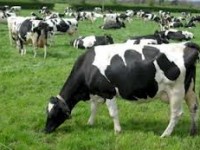Cows are herbivores, and their natural diet consists mainly of grass and other vegetation found in pastures. However, there are certain scenarios in which cows could benefit from consuming concentrate animal feed, which is a specially formulated blend of nutrients and minerals. This article will explore why cows sometimes require this type of feed and how it can contribute to their overall health and productivity.
Nutritional requirements: While cows can derive most of their nutrient needs from grazing in pastures, there may be situations where the available feed quality is low or insufficient. For example, during the winter season or in regions with limited access to fresh grass, concentrate feed can act as a supplementary source of essential nutrients such as proteins, vitamins, and minerals. This ensures that cows receive a balanced diet regardless of seasonal variations.
Enhanced growth and development: Providing cows with concentrate feed can promote optimal growth and development, especially in young calves. Calves have high energy requirements for rapid growth during their early stages of life, and concentrate feed can help meet these demands. It contains higher levels of protein, which supports muscle and tissue development, and essential minerals that aid in bone formation and overall skeletal health.
Increased milk production: For dairy cows, concentrate feed plays a crucial role in enhancing milk production. By providing a concentrated source of energy and protein, it enables cows to meet the high demands of milk production efficiently. This feed also contains specific nutrients like bypass proteins and vitamins, which enhance milk quality and quantity. In turn, this benefits dairy farmers by maximizing their profits and meeting market demands for milk and dairy products.
Improved fertility and reproductive efficiency: Proper nutrition is essential for maintaining reproductive health in cattle. Cows that have access to concentrate feed are more likely to reach their breeding weight earlier and exhibit improved fertility rates. This is particularly significant in intensive breeding systems, where farmers aim to achieve multiple pregnancies in a short period. Concentrate feed provides the necessary energy and nutrients for successful ovulation, conception, and fetal development, resulting in higher reproductive efficiency.
Supplementary feeding during stress or illness: Cows that undergo stressful situations, such as transportation, weaning, or exposure to extreme weather conditions, may experience reduced appetite and weight loss. Concentrate feed can serve as a supplementary source of nutrition during these periods, providing cows with readily available energy and essential nutrients. Moreover, during illness or recovery from surgery, concentrate feed can help in restoring the cow’s strength and promoting faster healing.
Efficient feed conversion: Concentrate feed is typically highly digestible, allowing for efficient nutrient absorption and conversion into productive outputs such as milk production and weight gain. This reduces wastage and promotes economic efficiency for farmers, as the nutrients are utilized effectively, leading to improved feed conversion ratios.
While concentrate feed can be beneficial for cows, it is essential to ensure its proper usage and integration into their diets. Consulting with a veterinarian or nutritionist to determine the appropriate type and amount of concentrate feed based on individual cow requirements and nutritional deficiencies is crucial.
In conclusion, concentrate animal feed serves as a valuable tool in maintaining the health, growth, and productivity of cows. Its role as a supplementary source of nutrients, especially during challenging environmental or physiological conditions, ensures that cows receive the necessary dietary support for their overall well-being. By carefully integrating concentrate feed into their diets, farmers can optimize productivity levels and maintain a sustainable and profitable cattle industry.

